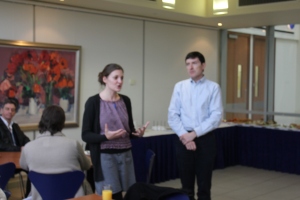In late November last year, we let you know about an event called Who Needs Languages? The purpose of this event was to raise awareness of linguistic diversity in Scotland and foster better understanding of Scotland’s language needs. More than 30 people came and made the event a great success.
Every speaker was keen to remind us just how important languages are to everyday life in Scotland. Speakers from agencies, public bodies and political organisations reminded us that, while excellent translation and interpreting rarely comes cheap, without it, vital services are inaccessible and vital business is lost. How could a new arrival to Britain do something as simple as visit the doctor unless interpreters are available? How can British businesses grow in international markets without the help of skilled language professionals? How could the EU survive without multilingual, dedicated staff?
From maternity units to multinationals and from politics to police stations, the old attitude of “everyone speaks English” is working less and less. Sadly, our education system doesn’t seem to be keeping pace with the obvious need for language professionals. As Sarah Breslin from Scottish CILT reminded us, since language learning ceased to be compulsory at Standard Grade level, the number of pupils taking up languages at Secondary School had nose-dived. It’s no wonder then that Neil Mitchison, from the European Commission Office in Scotland, called our attention to the growing need for native-English speaking translators, interpreters and multilingual legal experts.
Much of the morning was therefore dedicated to how to meet the need for language learning and language professionals. Audience members discussed the usefulness of forcing pupils to learn languages, how best to persuade people that learning a language is worth the effort and the role that language teaching plays in the way languages are seen in our society.
The day ended with the launch of the Language Policy Scotland Network, which aims to provide a place where academics, practitioners and policy makers to exchange ideas about language needs, provision and policy in Scotland.
You can find some pictures from the event and the networking lunch below. Now, however, it is your turn to contribute. How do you think Scotland can improve our record in language learning and the training of language professionals? How can we persuade people of all ages that learning another language is worth it? What made you want to learn another language?
Over to you!




While linguists consider language learning to be a necessity what about businesses? Many large companies may declare that language skills are invaluable but this is not being translated into actual vacancies for language graduates. Sadly there are too few jobs being advertised in Scotland that demonstrate the value placed on language skills. We may lament the poor take up of languages in secondary school, but excellent Scottish universities churn out qualified graduated every year. Where do they go? Abroad or down south, of they feel they may have no other option than teaching, translation or interpreting rather than going into business. You can teach marketing or accounting to a linguist in a much shorter time than it takes for a marketing or accounts graduates to achieve linguistic competence. Until businesses realise that and act on it, language learning will be undervalued and real progress will be slow.
A reply from Prof Graham Turner:
“My sense is that we (Brits) are typically used to taking language for granted: so it too rarely occurs to people that they may be missing out on account of their monolingualism. It’s amazingly short-sighted – but who, in the public realm, is really prominently championing language-learning? Look, for example, at the New Year’s Honours list (http://www.direct.gov.uk/en/Nl1/Newsroom/DG_200708): no shortage of recognition for leading figures in ‘science and technology’, but not much joy for languages. (The nearest prominent recognition is for Jean Gross, England’s Communications Champion for Children, who has helped to improve services for children and young people with speech, language and communication needs: entirely admirable, but effectively English-language focused.) The one public figure many could cite as a linguistic example to others is the Deputy Prime Minister, Nick Clegg (“Clever Clegg minds his languages – all six of them”, “The United Nations of Clegg”), but the British public never gets to hear him demonstrating or promoting the benefit of such skills. So who will step up and make some noise for multilingualism?”